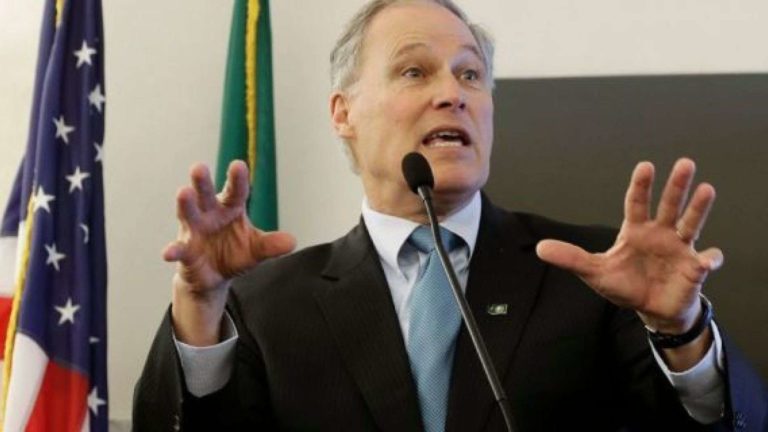Declaring climate change the nation’s most pressing issue, Washington Gov. Jay Inslee launched his 2020 Democratic presidential bid on Friday with a promise to refocus American government and society.
“It is time for our nation to set a new priority,” Inslee told supporters gathered at a solar panel business in Seattle. “This is truly our moment. It is our moment to solve America’s most daunting challenge and make it the first, foremost and paramount duty of the United States … to defeat climate change.”
The 68-year-old former congressman becomes the first governor to enter a race dominated by senators. Montana Gov. Steve Bullock and former Colorado Gov. John Hickenlooper also are eyeing presidential campaigns.
It won’t be easy for Inslee to garner attention with prominent senators already running: Cory Booker of New Jersey, Kirsten Gillibrand of New York, Kamala Harris of California, Amy Klobuchar of Minnesota, Bernie Sanders of Vermont and Elizabeth Warren of Massachusetts. Former Vice President Joe Biden and former Texas Rep. Beto O’Rourke also are expected to make highly anticipated 2020 announcements in the coming weeks.
But Inslee says his emphasis on combating climate change sets him apart from his competitors and from Republican President Donald Trump.
“We are all angry and outraged by this president. I am, too,” he said, adding that rather than get drawn into Trump’s vortex, he would “unite Americans in this moment to solve our most urgent problem.”
Inslee frames climate action as an economic opportunity, not just a moral imperative. He didn’t talk specifically Friday about the costs of his vision, other than to criticize considerable tax subsidies for the fossil fuel industry. But he argued that public and private investments in clean energy are a net boon for working Americans that would create “millions of jobs” doing such work as building “electric cars in Michigan” and installing solar panels on homes in every state.
Inslee argues that no presidential candidate has hinged a campaign as heavily on climate and environmental policy as he will. He unveiled a blue and green campaign logo with an arc of the Earth, eschewing the typical red, white and blue. His Twitter feed Friday was replete with the hashtag #OurClimateMoment.
He plans his first trip as a candidate to Iowa next week, with events geared to climate issues. Trips to Nevada and California will follow.
Inslee may have a larger opening on climate since billionaire environmental activist Tom Steyer has passed on a national campaign, opting instead to continue his advocacy for impeaching and removing Trump from office. Former New York City Mayor Michael Bloomberg, a billionaire who has spent millions of dollars on climate issues, may run.
Steyer tweeted Friday: “It’s good to know that a climate champion like @GovInslee will be in the race, pushing the country to recognize what is at stake.”
Inslee hasn’t specifically endorsed the Green New Deal introduced by New York Rep. Alexandria Ocasio-Cortez and Massachusetts Sen. Ed Markey, and he didn’t during his speech Friday. But he said last month that he was “thrilled that this … resolution has been brought forward” to push for action.
He has argued separately for an issue-by-issue approach that adds up to sweeping change. He announced his intention Friday to “power our economy with 100 percent clean energy,” but he set no target date for the U.S. to become carbon neutral. The Green New Deal sets a target of 2030.
Despite his emphasis on climate policy, Inslee says he’s not a one-issue candidate. He pitches his breadth of personal and political experiences as ideal to bridge political and cultural divides among the Democratic base and the broader electorate.
Inslee has governed Washington state as an unabashed liberal, promoting clean energy, gay rights, abortion rights, environmental preservation, tighter gun restrictions and more spending for education and job training. In Congress, he voted against the U.S. invasion of Iraq in 2003 and for a ban on certain military-style guns.
Most recently, he’s called for a state-based public option health insurance plan in Washington that he says is a “step toward universal health care.”
The state GOP recently has derided his “extreme environmental agenda” and pointed to its price tag.
Inslee started his legal and political career in small-town central Washington, winning a state legislative post and, for one term, a congressional seat before being knocked out in the GOP sweep of 1994. He returned to Congress representing a metro-Seattle district for 12 years before resigning to run for governor in 2012.
Inslee raised his profile serving as the chairman of the Democratic Governors Association in 2018; Democrats picked up seven governor’s offices, and Inslee became a familiar guest to cable news audiences, using the opportunity to lambaste Trump on such issues as immigration and ethics.
“Unlike the man in the White House, I believe in all the people who make up America,” he said Friday.
Recent polling suggests at least some wisdom for trying to become the climate change candidate.
An Associated Press-NORC Center for Public Affairs Research poll from December found that self-identified liberal Democrats see the environment as a critical issue: 49 percent named it among their top priorities, compared with 29 percent of conservative and moderate Democrats. Sixteen percent of liberal and moderate Republicans and just 3 percent of conservative Republicans mentioned the environment as a major problem.
In an open-ended question, 24 percent of all adults queried named environmental issues and climate change among the top five government priorities this year; 18 percent mentioned the issue as a priority for 2018.
(AP)











